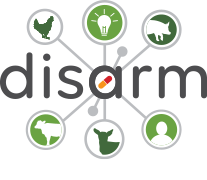In this section
In this section
Limiting Disease Spread
Reducing the likelihood and ability of disease to spread is critical in maintaining the health of farm animals. Managing groups where they are of a similar size and age can help reduce stress between individual animals. Keeping animals in a consistent environment that avoids stressors, such as mixing, overstocking etc., is helpful in supporting animals’ immune systems. Stress is known to lower the immune system of animals and make them prone to picking up infections from the environment.
When animals do occasionally become sick, having a separate area way from the rest of the group i.e. quarantine pens/sheds is recommended. Allocating specific quarantine-only equipment, clothes, or even personnel that stays with the quarantine area is also good practice. This means that any sick animal is prevented from spreading the virus or bacteria from excretions or direct contact with otherwise healthy animals. By limiting contact between sick and healthy animals, the spread of infection is minimised and the number of animals that would need treatment is reduced. The practice of isolating sick animals and preventing the spread of disease is essentially internal biosecurity and there are many examples in the pig and poultry sectors of strict biosecurity measures that other sectors could learn from.

